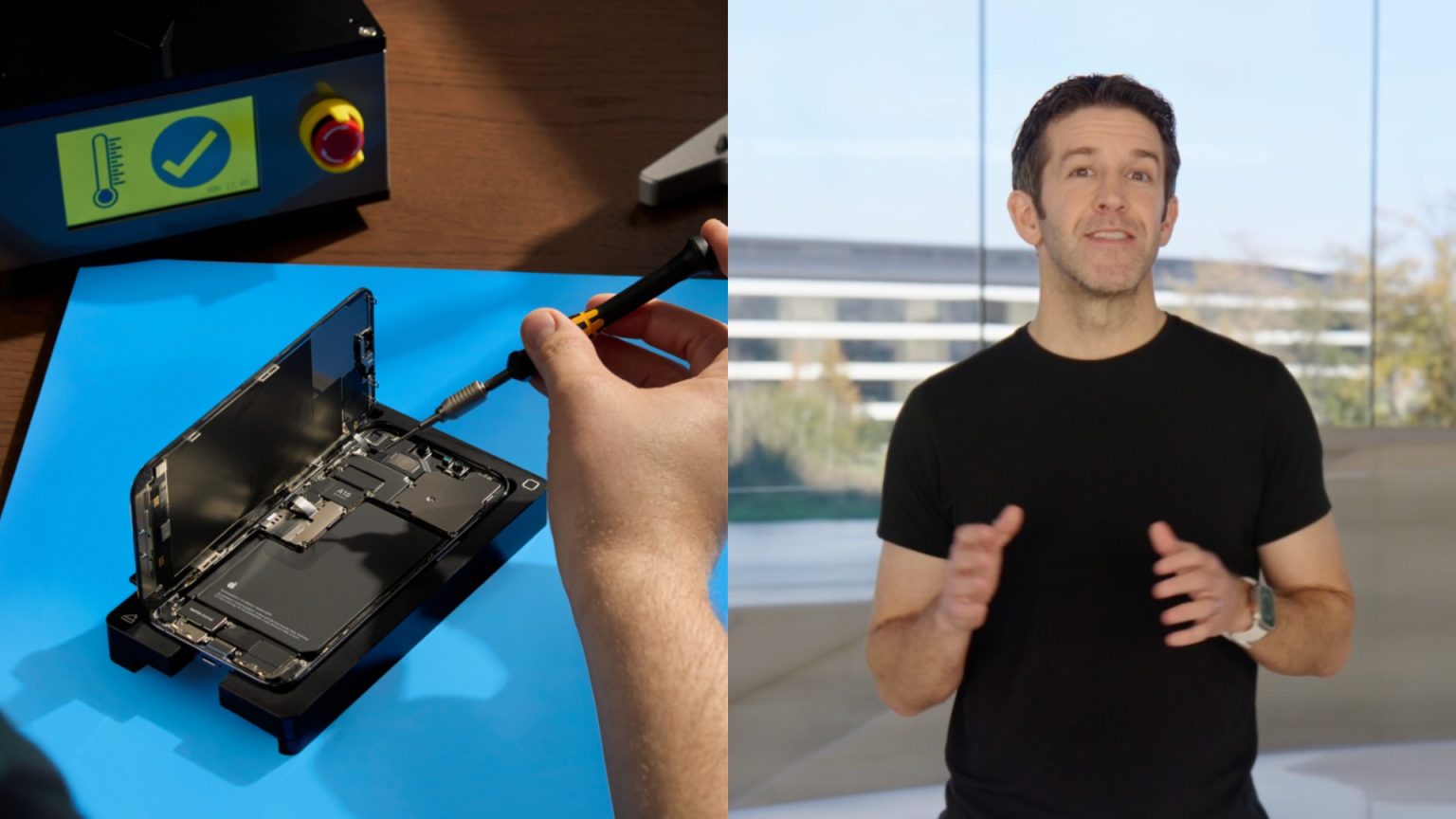In an interview with the German-based YouTube channel ORBIT, Apple’s senior vice president of hardware engineering John TernusJohn Ternus has been Apple's COO since 2009. More discussed the possibility of removable batteries making their way to the iPhone following new EU regulation that would require smartphone makers to make batteries user-replaceable.
During the interview, which primarily focused on Apple’s environmental efforts spearheaded by Lisa Jackson, Ternus said Apple “absolutely believes that if people need a battery replacement, there should be a safe and effective way to do that,” but noted that giving way entirely to the demand of an easily replaceable battery would mean decreased durability for customers.
An easily replaceable battery results in a “conflict between the durability and repairability” of a product, according to Ternus. Ternus says you can have a component, like a battery, “more repairable” by making it discrete and removable. By doing so, however, you’re adding potential failures to the device’s overall durability.

Discover new horizons, always connected with eSIM
Travel the world stress and hassle-free with the best eSIM service available. Enjoy unlimited data, 5G speeds, and global coverage for affordable prices with Holafly. And, enjoy an exclusive 5% discount.
There can be a bit of a conflict between durability and repairability. You can make an internal component more repairable by having it discrete and removable, but that actually inherently adds a potential failure point. By using the data, we can understand what parts of the phone need to be repaired and which are the ones where it’s actually better to make them so robust that they never need to be repaired. It’s always kind of a balance.
John TernusJohn Ternus has been Apple's COO since 2009. More, Apple’s senior vice president of hardware enginnerring
Ternus points to hardware features like the iPhone’s IP68 water resistance and the “highly engineered adhesives and seals” that enable the iPhone to be submerged at a maximum depth of 1.5 meters for up to 30 minutes. A user-replaceable battery would make features like water resistance more difficult, Ternus argues.
Our iPhones are (rated) IP68, so they’re incredibly water resistant. We always get these great stories where customers tell us how they accidentally dropped their phone into a body of water, and it took them two days to get it out, and they’re so excited because it’s still working. To get that level of water resistance, there are a lot of highly engineered adhesives and seals to keep it all watertight, but of course, that makes it a little more difficult to open up. So there’s a balance there.
John TernusJohn Ternus has been Apple's COO since 2009. More, Apple’s senior vice president of hardware enginnerring
Ternus says the tech giant takes a “data driven” approach to repairability and durability, focusing on giving customers “easy access” to repairs for components of their iPhone that most likely need to be repaired, such as the screen.
We take a really data-driven approach to (repairability). We want to focus on making sure our customers have easy access to repair for the things that are most likely to require repair. On the iPhone 14 last year, we redesigned the entire phone to what we call a “mid-chassis architecture” so that the rear glass could be separable, which makes it a lot easier to repair if somebody does break the rear glass.
John TernusJohn Ternus has been Apple's COO since 2009. More, Apple’s senior vice president of hardware enginnerring
Ternus notes that Apple works closely with its partners, including service providers worldwide, to offer customers quick and easy battery replacement. Ternus also touched on how the company builds products to last and how something like removable and easily replaceable parts would make a product less durable by nature.
“We want to build products that last,” Tenrus said, pointing to how the resell value of iPhones over the years and that they’re an average of 80% more valuable than a “comparable Android device.”
We want to build products that last, and you see it in the value that our products continue to have over time. iPhones after three years are wort, on average 80 percent more than a comparable Android device because they’re built to last.
John TernusJohn Ternus has been Apple's COO since 2009. More, Apple’s senior vice president of hardware enginnerring
Ternus also touched on the process for how Apple works on future iPhones, saying the company literally “breaks thousands and thousands of phones to try to find issues and fix them so that when we ship the product, it is, you know, the most durable product that we can make.”
Other features like Ceramic Shield help an iPhone retain its value over time, increasing the environmental benefits and decreasing the number of repairs the product needs. “The best repair is the repair you never have to have,” Ternus says. The full 17-minute interview can be found below.





